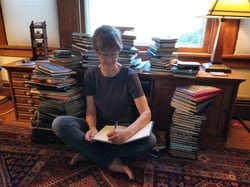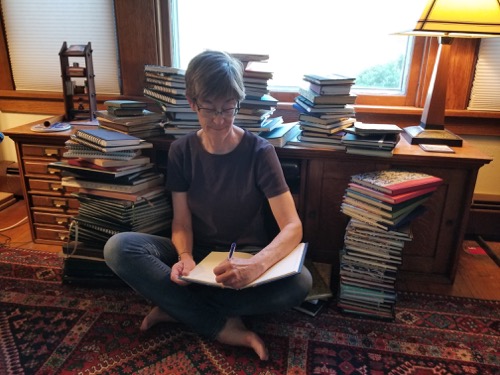Most advice about journaling encourages us to simply “pick up a pen, grab a notebook, and write down your thoughts.” A sense of freshness and spontaneity helps people get started. But journal writing didn’t begin five minutes ago. People have used diaries for centuries, and each historical age has developed new ways to keep them.
About fifteen years ago the diary went online and turned what was once a private refuge into stories acted out on a global stage. Words, once the diary’s staple ingredient, suddenly had less importance. A loud parade of visuals—banners, outlines, logos, stock photos of landscapes or accessories—might now eclipse the space of reflection, analysis of situations, and internal dialogue that traditionally filled diaries.
Journal writers could understandably feel constrained by what the form seems to have become. If diary writers half a century ago felt they should keep their books under lock and key, begin every entry with “Dear diary,” and focus on the ups and downs of their romantic lives, today’s journal-keeper may feel obliged to go public, rely on lots of images, and measure success by how many hits their site receives. The pressure can extend even to private book diaries, as we compare ours to the elaborate calligraphy and artwork in journals that are handcrafted to post online.
But not all journal writers limit themselves to what’s trending in their culture. While his contemporaries kept somber religious diaries, Samuel Pepys wrote juicy entries about political intrigue and his sexual adventures. While her friends dedicated their pages to introspection, Virginia Woolf declared that she didn’t have an “inner life,” choosing to experiment with style, nail down memorable moments, and dash off verbal portraits of people she met. The “tanka diary” of Harryette Mullen, a poet and professor of African American literature, consists of brief poems she wrote daily while exploring nature in an urban landscape.
 One can keep a journal that pushes back against expectations. Today this might mean following your impulse to delve deeper with words, choose a simple format, or take more time to hold back a journal entry before sharing it with an audience.
One can keep a journal that pushes back against expectations. Today this might mean following your impulse to delve deeper with words, choose a simple format, or take more time to hold back a journal entry before sharing it with an audience.
When published diaries gained popularity in the late 19th century, writers found them. Learning from past examples, they could claim a tradition. Virginia Woolf searched for historical diaries—including that of Pepys—and borrowed their methods. The next generation read Woolf’s diaries along with Anne Frank’s Diary of a Young Girl and a spate of best-selling fictional diaries.
Even though the form is considered private and secret—or maybe for exactly this reason—it’s fascinating to read diaries. Examples abound, from the ancient Japanese pillow-book of Sei Shōnagon to what’s newly published every year. Libraries, archives, and bookstores hold a trove of diaries by servants and royalty, prisoners and film stars, teenagers, soldiers, travelers, and people describing new parenthood or chronicling their journey with an illness.
Maybe you’ll find a diary that describes life in your own neighborhood a hundred years ago, or one that recounts your family history. As you read, notice how the diary announces its purpose, frames each entry, and speaks to an imagined audience. What do they leave out? How much opinion do they mingle with the facts of what happened? Can you tell how they feel toward other people in their life, their jobs or schoolwork, their surroundings? Does any major historical event appear in the diary’s pages? As you become a reader of diaries, both published and unpublished (with permission, of course!), you will develop your own journal voice, distinct from others of your historical time.
 Paula Vene Smith is a college professor whose published work includes short fiction, poetry, and a book to help academic leaders (deans, department chairs, senior executives) manage risk at their institutions. Paula teaches English at Grinnell College and occasionally elsewhere. After offering a course in London on the history and practice of diaries, she has created a website called “Discovering Diaries” to explore the many dimensions of reading and keeping journals.
Paula Vene Smith is a college professor whose published work includes short fiction, poetry, and a book to help academic leaders (deans, department chairs, senior executives) manage risk at their institutions. Paula teaches English at Grinnell College and occasionally elsewhere. After offering a course in London on the history and practice of diaries, she has created a website called “Discovering Diaries” to explore the many dimensions of reading and keeping journals.



Leave Comment